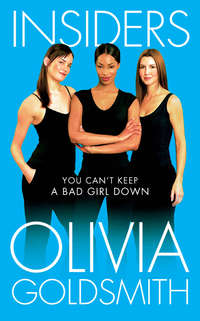
Полная версия
Young Wives
Even more adversity than she thought, however. Clinton rose from the kitchen chair he’d been sprawled in and came up beside her. It wasn’t to help with the damn dinner, but to take the refrigerator door out of her hands and close it behind her. He leaned on it. “What do you think you’re doing?” he asked.
“Making the dinner that you should have made?” she responded. He was worse than DAS. The man was dead and stupid.
“Don’t try to get smart. You’ve already been dumb,” he told her. “What are those kids doing over here?”
She narrowed her eyes. “Those kids?” she asked. “You mean Frankie and Jenna? Those kids are always over here, or our kids are always at their house.”
“Not anymore,” Clinton said.
“Oh, Clinton, don’t start with me.” She did not have the patience for this kind of bullshit. Not today. Not now. Not from this bastard, who was spending his days with his dick in some other woman and his nights taking his kids for granted.
“Those children shouldn’t be over here.”
“Shouldn’t? Why shouldn’t they?”
“Because I don’t want them influencing my children.”
“Oh, today they’re your children?” she glared at him. “When did they become your children? They weren’t yours the other night, when Shavonne had her book report to write or the day before, when Kevon had diarrhea. You think Jenna is a danger to Shavonne, who bullies that girl shamelessly? And do you think that Frankie could influence anything right now?” She crossed the kitchen, her steps fast and angry, not that they made much noise against the plywood of the unfinished floor. She started to set the table.
“Are you through running your mouth?” Clinton asked. “Because you’re just missing the point. Number one, they’re the children of a drug dealer. Number two, if you don’t think the police are watching them and everything they do right now—”
“The police are watching everything that Frankie does? Well, that’s an easy job. Even you could do it. ’Cause Frankie isn’t doing dick.”
“Don’t show a smart mouth to me,” Clinton said, narrowing his eyes. “I’m telling you that a black man in Westchester don’t need a connection with a drug lord.”
“Drug lord? Goddamn it, Clinton. I know you don’t like Frank and I know you’re envious of him. But maybe, just maybe, he’s not guilty.” She threw the napkins on the table. “Every time one of your damn useless White Plains home boys gets busted, you’re telling me about police conspiracies and frame-ups all night long. Now they’re just? Clinton, they didn’t find any drugs next door. I don’t think the man’s involved with drugs. Maybe some bribes, maybe some crooked contracts, but not drugs.”
Jada walked closer to him, but not within arm’s reach. She had let her voice rise. She didn’t want the children to hear this, and she didn’t even want to be having this conversation with Clinton. But she wondered if she should be jeopardizing her marriage and her family for her friendship with a white woman. It occurred to her that Mich probably wouldn’t do it for her.
“You know Michelle,” Jada continued anyway. “You know these children. And you know how much Frank loves them, so just stop it, Clinton. Have some compassion. Would you want to have to bring your children home to this house after uniformed vandals tore it apart? Michelle is over there crying her heart out and cleaning up, and after dinner I’m going over to help her.”
“You are not going over there,” Clinton said, and came around the table and took her hand. He held it hard.
She snapped it out of his grip and held it up in front of her face. “Talk to the palm, Clinton. Because the ears aren’t hearing.” She turned away. “Didn’t you ever hear of due process? Let’s try to be Christians about this, Clinton. Don’t be so holier than thou. You only go to church to meet your lover.”
“Come on, Jada. Frank Russo is the kind of white man who—”
“This has nothing to do with race, Clinton,” Jada snapped. “I don’t know what Frank Russo did or didn’t do. But I know he’s not sleeping around, tearing his family apart. I know he’s not using his church as a singles bar.” All at once her rage rose within her and she felt it pushing words out of her mouth. “You’ve had plenty of time to make your damned decision and I’m tired of waiting for you to make it. I have waited and I hoped that you would make a decision—any decision. But you haven’t. So I have to. If you go down to Tonya’s again, don’t come back Clinton. I mean it. The deadline has long expired.”
“Don’t you threaten me,” Clinton warned her. “You can’t take my children away. You didn’t even want the baby.”
Jada snapped her head back as if she’d been slapped. “Don’t go there,” she said. “I’m not making you give up anything. You’re choosing to leave it, to leave us.”
Clinton moved very close to her, and for a moment his size and the anger she could feel in him frightened her. She didn’t—wouldn’t—let herself take a step backward, away from him, but she was scared, though she hoped it didn’t show. “Don’t you dare go over there tonight,” Clinton said to her.
“Don’t you dare give me orders,” Jada spat right back at him. “Why don’t you give the children their dinner instead? Something useful, instead of stupid threats.” She leaned toward him, just to show him he didn’t scare her. “I listen to God and my conscience before I listen to you. Michelle’s my friend. She would do it for me.” And with that Jada spun around, away from him and out the kitchen door into the relief of the cool darkness.
12
Wherein Angela stops playing hooky and instead gets hooked
Angela was dressed, for the first time in almost a week, in real clothes. She was wearing what she thought of as “a cheap legal suit”—one of those rayon-and-wool blend, navy blue jacket and skirt jobs that was a knock-off of what all the women at her ex-law firm used to wear. This one, though, was a real cheap one. And big. She’d gone up to double digits. You didn’t want your size or your IQ to be there.
Yesterday she had forced herself up and out of the house, and had dragged herself over to Hit or Miss. Now she looked down at herself, sitting behind the wheel of her father’s Dodge Dart, the one he referred to as “the spare.” This outfit certainly couldn’t be called a hit, so it must be a miss. She was a miss now, too. Or on her way to becoming one. An unmarried miss.
She needed the suit, because today she was showing up at the White Plains Women’s Legal Crisis Center. Her mother, definitely for Angela’s own good, had insisted that Angie show up today. She didn’t feel like it, but she didn’t feel like doing anything. She was even tired of lying on her back and staring up at the ceiling. She hadn’t seen anything good on television, not even on A&E, in the last four or five days. There also wasn’t anything good to eat left at her father’s—she was down to no-fat Snackwell cookies and she’d just as soon eat cardboard, or nothing. She was still miserably unhappy but, she had to admit, she was also bored.
“You have to do something,” her mother had insisted. “Just visit us.” So Angie agreed. It might as well be the Women’s Center, though now, squeezed into the cheesy size ten (she’d been an easy six when she’d boarded the Boston shuttle), and driving this car in this disembodied place she’d never lived in, she longed for the black sofa again.
Angie pulled up to the building off the Post Road, where the WLCC was located. She pulled into the lot. Parking here, she noticed, was a lot different than at her suburban Boston firm, where every car that wasn’t a Lexus was a Volvo. Or a Jaguar or a Mercedes or a BMW, when you talked about the partners. Here the cars looked like automobiles from another culture altogether—people who had to make payments on used cars they couldn’t quite afford. The Dart fit right in. Angie got out of the car and walked past the dented Chevys, the late-model Buicks, the rusted Ford Escorts.
When she got to the lobby, there was no sign, so she had to ask for legal services offices, then walked the stairs to the second floor instead of taking the elevator. What the hell. It would be the first exercise of her new life. She was breathless by the time she got to the top, even though it was only one flight. She, who used to do the Stairmaster for forty-five minutes! Well, she reminded herself, she had just spent several days horizontal.
Now to face Natalie. Angie waited for her breathing to even out. She’d need it to face Natalie. After her divorce, her mother had become all fired up about a whole bunch of things. Angie guessed it was a good thing. Her mom had gone to law school, gotten her degree, and since then had only practiced law for women who were in need. Angie had been inspired, and she was sure one of the reasons she’d gone on to law school was because of her mother. On the other hand, it wasn’t always convenient to have a mother whose priorities were so political.
Hesitantly, suddenly feeling shy, Angie walked into the WLCC office. A black receptionist looked up, but behind her Laura Hampton was looking over some papers.
Laura saw her and smiled. “Oh. Hi, Angela. Good to see you.” Laura walked around the side of the reception counter and kissed her cheek.
Angie liked Laura, the woman who had handled her mom’s divorce and then who had … well, handled her mother. The two women had lived together for almost five years, but had split last Christmas. Angie had never asked why.
Now Laura took Angie’s left hand in both of hers and held it. “I heard from your mother about Reid,” she said, her voice low. “I’m so sorry.”
Angie nodded, then took a quick glance around the waiting room they were standing in. There were two heavy middle-aged women sitting at either end of a battered sofa like a pair of bookends, and a painfully thin Indian woman in a sari sitting at attention in one of the straight-backed chairs on the other side of the room, jingling her bracelets nervously along her arm. Angie’s heart sank. It was as bad as she had pictured it, maybe worse. All three looked drowned in their own misery, but Angie figured at least she didn’t have to share her own. She merely nodded at Laura, who took the hint.
“Where’s my mother?” Angie asked, and felt panic rising.
“Your mother had to show up at court, but just for a little while. She’ll be back in the next hour.” Angie tried to smile, but only managed to nod.
She hung up her coat and followed Laura down a short hallway to a tiny room with only one window high up in the wall. The rest of the room was jammed with metal file cabinets, a battered desk, and two chairs. Papers and files were stacked on every surface. “Karen Levin-Thomas is the attorney who usually works here,” Laura told her. “But she’s in the hospital right now and she’ll be out for a few months. Why don’t you sit here?”
“Take a look at these while you’re waiting for your mom,” Laura had suggested, pleasant and cool and oblivious to Angie’s total emotional collapse. Angie did, and once she’d begun to read through the first fat file she forgot about her surroundings.
Angie wiped the tears out of her eyes with the back of her hand. But, for the first time in days, they weren’t tears of self-pity. They were tears of pity for others, as well as something else … something frightening that she couldn’t exactly define. It seemed as if the hour or so she’d been in this messy room had stretched into days—or as if she’d been in the room long enough to experience other people’s lifetimes. Angie had looked at file after file. Every one had shocked her; the stories were horrible. They weren’t all betrayals by husbands, though there was a lot of that. There were other betrayals, but almost all of them were betrayals of women by men—men who held power because the women loved them, or men who held power because they were a woman’s boss, or because the court had given them power.
The files raised a lot of questions that Angie couldn’t answer. Except perhaps for one—why she was there. So many of the cases had shocked her with the disservice the legal system had done and the horrors that the women clients were going through: a woman with restraining orders but being stalked by her violent ex-husband nonetheless, another who had lost her house and was living with her children in a shelter while her husband had taken all of their assets and was living in Canada. Deadbeat dads. Several older women bilked by “investment advisors.” Oh, the lists went on and on. Every one of these women couldn’t have had a shoddy lawyer—although there were certainly enough of them to go around.
The women who came here needed help, and Angie realized she could help them. But she’d been avoiding the knowledge for a long, long time. In law school, after graduation, while she looked for a job, when she got engaged to Reid. She’d always known about her mother’s grim work. She just hadn’t wanted to cope with this kind of unfairness. She wanted to have her perfect selfish life, preferably with Reid.
So, now that she wasn’t going to have Needham and Reid, why didn’t she want this? She did feel the injustice, and feel it deeply. But there was something in the way. Difficult as it was, Angie sat with the feeling. And then she recognized that under her pity and compassion, it was a kind of nausea, and she knew it for fear. These grim files, these grim lives, could have been her own. She could wind up as alone and unloved as these women seemed to be. The fear that had been building in her stomach almost rose to her throat. For days and days she had been fighting off the impulse to call Reid again.
She’d tried to think of a million reasons why the Soprano would answer the phone: he could have hired a maid, he could be staying at his parents and a neighbor could be checking on the plants, he could have found a sister who had been missing for thirty years, he could have taken a eunuch as a roommate. More realistically, Angie admitted to herself she could be in denial. Because however far-fetched the reasons, she actually wanted to believe one of them. So far she had resisted the phone and refused the two other deliveries that Reid had sent—another bouquet and something from a bookstore. So far she’d held out.
But now, here, surrounded by lives encased in manila folders, lives that seemed as empty and loveless as hers did, Angie reached for the phone. She dialed her husband’s office number. As the phone rang at the other end she knew she should hang up. She should call Lisa and get talked down, like from a bad acid trip. But the feeling, the compulsion, was so strong she couldn’t control herself.
“Andover Putnam,” the switchboard operator said.
“Reid Wakefield,” Angie requested, and just saying his name aloud sent a shiver all the way down the back of her neck.
Just then the door to the overcrowded little office swung open and her mother walked in. Angie put the phone down quickly, as if she’d been caught with a vibrator instead of a receiver in her hand. She felt her face flush and hoped her mother didn’t notice.
“Having fun?” Natalie asked.
“Fun? I’m so upset I can’t see straight,” Angie admitted. She didn’t have to admit all the reasons she was upset. She took a breath or two and looked down at a couple of the folders. “I mean this Carolyn Stoyers custody case, and the things immigration did to that Vietnamese woman …”
“That’s nothin’,” Natalie said and threw a fat file down on the desk in front of Angie. “Take a look at this one. You want injustice, see what they tried to do to JoAnn Bloom. Too bad Karen got sick,” Natalie said. “But she’s a tough bird. She’ll be back. At least until she’s through chemotherapy.” Angie sat and looked at the folder.
“What happens in the meantime?” Angie asked, finally looking at her mother’s blank face. She knew that her mother was holding out the hook and hoping that it stuck, and she was afraid that maybe it might.
“You know,” Angie said, before her mother could answer, “ever since you and Daddy divorced, I thought you were, well, a little adamant. I know he tried to give you a raw deal, but I just didn’t believe that all women were being given raw deals. I thought that maybe you were … paranoid.”
“You know what William Burroughs used to say, don’t you?” Angie shook her head. ‘“Paranoia is having all the facts.’” Natalie’s gaze swept the room. “Nice office space, huh?” she asked.
Angie looked up at her. “What are you asking?”
“Whether you want to give a few hours of your time to help out.”
“A few hours?” Angie laughed. “It would take my whole life time to fix this.”
“Oh, a lot more than that,” Natalie said. “But you could take a small bite. Just something to chew on while you find your feet.”
Angie knew her mother, knew her strategy, but nodded anyway. She wouldn’t get sucked in forever. Still, she could do this now. She couldn’t go back to Needham.
“Okay,” she said. “But it’s just temporary. It’s just for right now.”
13
In which Michelle cleans up the debris with a little help from her friend
Michelle was on her hands and knees trying to pick the bigger pieces of broken glass out of the carpet. She’d stopped crying a long time ago—sometime after she’d quit looking for Pookie out in the dark, and before she’d tried to put some order into the wreckage of her children’s rooms upstairs. She’d had to settle for eliminating, filling six big garbage bags with all of the torn pillows, smashed toys, broken knickknacks, shredded posters, and other mangled bits and pieces of her two children’s material lives. Frank had helped her put their son’s bunk beds upright but, battered himself and with at least one rib broken, he had at last gone to lay down. Neither she nor Frank wanted the children to see their father’s face tonight, and maybe not tomorrow. It even frightened Michelle. She had put ice on it, but it was really too late for that. He would look frightening for the next week at least.
Michelle knelt there. She thought of the joke Jada always made. She was like Cinderella now, but there was no fairy godmother. She was about to get up from her knees when she saw yet more glass, these shards glinting from under the ottoman. As she reached to extract them she realized she’d used the exact same motion only twenty-four hours ago, though her house had been perfect then and she was only reaching for innocent Legos. Tears began to roll down her cheeks, and with both hands now full of broken glass, she couldn’t wipe them away. What was the use, anyhow? she asked herself hopelessly. She’d probably be crying for years. She felt like a car crash victim. How right she’d been. Most accidents did happen in the home.
After the horror of last night, Frank had called a lawyer. The lawyer had gotten her and—after a considerable delay—Frank himself out of jail. The guy, named Rick Bruzeman, was a small very well-dressed man who seemed effective but far from sympathetic. Michelle wanted to tell him how outrageous, how awful the police had been, how she and Frank were innocent, and how this outrage, this unjust invasion should be on the front page of the newspaper. “Don’t worry. It will,” he said, “but not with that spin.” He didn’t seem to want to listen to her. Perhaps he’d heard it all before, and from people who weren’t innocent. What he’d done had been effective and efficient—he’d picked her up, he’d gotten the children released into her care, and he’d gotten Frank’s bail reduced and had him sprung—if that was the word you used for a legal exit from the Westchester Detention Center—but he seemed worse than cold. He seemed professional. He made Michelle feel more like a criminal than the police had.
Now Michelle stood up, the glass still in her hands, the tears still on her cheeks, and looked around again at the destruction. It was incredible, unbelievable. If the police had to search for drugs or whatever they suspected was hidden, did they also have to break, tear, and rip apart everything in their search? She started walking to the garbage bin she had placed in the center of the room and, as she did, her foot crunched against something spread in the carpet.
She looked down. What the hell was this? She crouched and looked more closely. At first she thought that it was potting soil from her corn plant, but then she recognized it was coffee. Coffee? Someone had opened—well, it looked like two or three of her sealed fresh cans of ground coffee, and had not only pawed through the stuff, but then thrown it onto the floor here. It had already sunk down into the weft of the carpet, but in some places it was thick enough to form little hills. Ironically she wondered if maybe Frankie would like to use the setting for his action figures—it would make a realistic battleground diorama.
She rose again, threw the glass into the garbage, and looked around. Framed pictures had been pulled off the walls, the canvases torn, the frames broken. The big mirror beside the credenza had been cracked. The contents of every drawer and cabinet had been pulled out and were lying now in mounds on the floor. There wasn’t an upholstered piece of furniture that hadn’t had its guts pulled apart, its cushions torn. Empty, the cushion covers now lay on the floor like giant crumpled condoms.
It was a nasty image, but there was something almost brutally sexual about all this, Michelle thought as she went for the Dustbuster. Her home had been rent apart. She felt almost as if she’d been invaded or raped. And look what it had done to Frank and her children. She’d pull it together as best she could, but the cracks and tears and dirt couldn’t be erased.
She looked past the dining room table into the hallway. She knew she should go outside and bring in her chairs, the chairs that were sitting in her front yard like drunken relatives advertising her family’s tragedy. She should also go out again and look for Pookie. But the fact was, she didn’t have the courage to do it. She had felt the neighbors’ eyes on her when she was outside. Anyway, she had to get this place decently cleaned up before the children could come in, but the task was so overwhelming that she didn’t know exactly what to do next.
So, instead of pulling out a new box of trash bags, she turned around and walked back up the stairs, passed the children’s emptied and scarred rooms, and into the master bedroom. Frank, one eye blackened, both cheeks bruised, was lying on the bed, perhaps lightly dozing. She should let him try to recuperate, but she couldn’t. As she got onto the bed, he opened his eyes. That was all she needed—to see his dark, pained eyes staring into hers—to start her crying again. “Oh, Frank, it’s so horrible. They’ve destroyed us, Frank.”
“No, they haven’t,” he told her and put his right arm out and around her. He winced with the pain of moving, but his arm felt so good on her shoulder and back. He soothed her while she wept against his side. “Michelle, babe, they attacked us. But they didn’t destroy us,” he said in his deepest, most serious voice. “I don’t know why, and I don’t know who decided to pull this horrible bullshit on us, but I’ll find out and I’ll take care of it, babe. I swear I will. We got the best lawyer. They busted us and there was nothing here. Nothing.” She nodded, her head now against his chest. “Thank God they didn’t plant something here.” Michelle shuddered at the thought. “We’ll sue the town, we’ll sue the county, we’ll sue the state. Keep a list of everything torn or broken. They’ll pay.” He looked at her. “They didn’t hurt you? They didn’t touch you?”
“No. No,” she answered him.
“They’ll pay. A few people will pay in other ways, too. I swear it, Michelle.”
“But why, Frank? How could they—”
“I don’t know, babe. But I’ll find out. Bruzeman is connected. He’s expensive but he’s worth it.” Michelle didn’t want to tell him how she felt about Bruzeman. “Maybe it was because of that shopping center deal,” Frank mused. “I don’t know. But they didn’t destroy us. They didn’t touch you, did they? Nobody at the police station touched you?”






